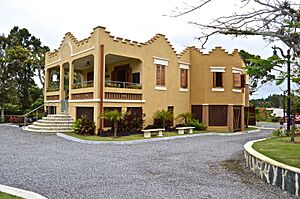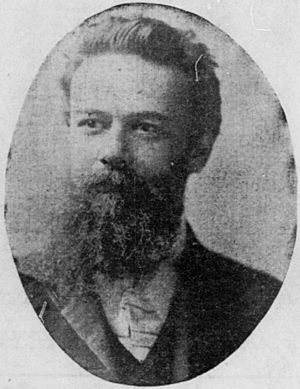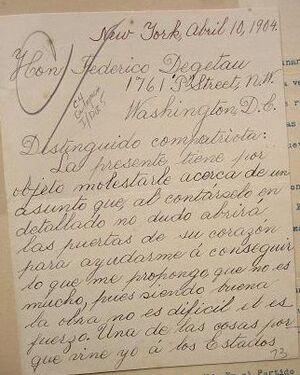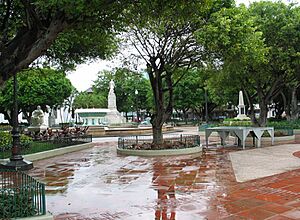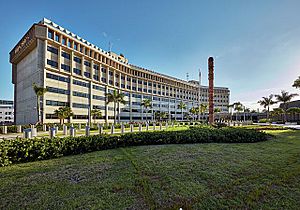Federico Degetau facts for kids
Quick facts for kids
Federico Degetau
|
|
|---|---|
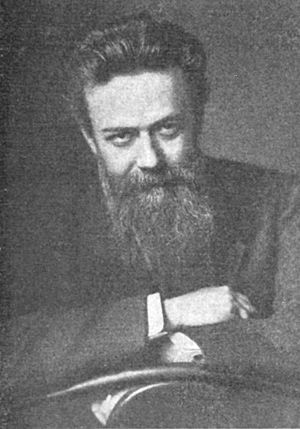 |
|
| Resident Commissioner of Puerto Rico | |
| In office March 4, 1901 – March 3, 1905 |
|
| Preceded by | Position established |
| Succeeded by | Tulio Larrínaga |
| Personal details | |
| Born |
Federico Degetau y González
December 5, 1862 Ponce, Puerto Rico |
| Died | January 20, 1914 (aged 51) Santurce, Puerto Rico |
| Political party | Republican |
| Education | Complutense University (LLB) |
Federico Degetau y González (born December 5, 1862 – died February 20, 1914) was an important figure from Puerto Rico. He was a politician, lawyer, and writer. He also became the very first Resident Commissioner of Puerto Rico to the U.S. House of Representatives.
Contents
Early Life and Education
Federico Degetau was born in 1862 in Ponce, Puerto Rico. He went to local schools there. His father, Mathias Degetau, came from a rich family in Hamburg, Germany. His mother, María Consolación González, was from a respected family in San Juan, Puerto Rico.
Degetau finished his studies in Barcelona, Spain. He then graduated from law school at the Complutense University of Madrid in Spain. After becoming a lawyer, he started working in Madrid. He also started a newspaper called La Isla de Puerto Rico. He used it to share information about Puerto Rico with the Spanish government.
Political Journey
Degetau later returned to Puerto Rico. In 1895, he was one of four leaders who asked Spain to give Puerto Rico more self-rule. Spain's government eventually agreed to this request. Degetau then settled in San Juan and continued his work as a lawyer.
He served on the city council of San Juan in 1897. In 1898, he became the mayor of San Juan. He also represented Puerto Rico in the Spanish Parliament that same year. After the Spanish–American War, the United States took control of Puerto Rico. In 1899, the military governor appointed Degetau as the Secretary of the Interior. This was part of the first government under American rule. He also helped with a board that supported charities.
Serving as Resident Commissioner
Degetau joined the Insular Republican Party when it was formed in 1899. He was the first vice president of the San Juan city council from 1899 to 1900. He also led the Board of Education in San Juan from 1900 to 1901.
In 1900, Degetau was elected as the first Resident Commissioner of Puerto Rico. This role allowed him to represent Puerto Rico in the U.S. House of Representatives. He was re-elected in 1902 and served from March 4, 1901, to March 3, 1905.
In 1902, Degetau gave a speech at Columbian University (now George Washington University). He explained his hopes for Puerto Rico's future. He believed Puerto Rico was a part of the United States because of its location and history. He hoped Puerto Rico would become an organized territory and later a U.S. state.
He also said:
[…] The American flag can perhaps be lowered in the distant Philippines. It must be maintained in the neighboring Island, with the institutions of liberty and justice that it represents.
While in Congress, Degetau worked on the Committee on Insular Affairs. He proposed a bill to give U.S. citizenship to people living in Puerto Rico, but it did not pass. He did not run for re-election in 1904 and went back to practicing law.
Before leaving Congress, Degetau gave a speech. He again asked for U.S. citizenship for Puerto Ricans. He also stated his strong loyalty to the U.S. Constitution:
I do not know, Mr. Chairman, I do not know, my friends, in this patriotic relation anything superior, anything higher than the American Constitution. I do not conceive anything more sacred that the oath to support it.
The Gonzales v. Williams Case
In 1905, Degetau traveled through Europe and bought many paintings. He then moved back to Puerto Rico and lived in Aibonito. There, he managed a coffee farm.
In 1902, the U.S. government changed its immigration rules for Puerto Ricans. A young pregnant woman named Isabel González was traveling to the U.S. when these new rules began. She was stopped at Ellis Island and called an "alien" (foreigner) and a "burden" (someone who would need help from the state). She lost her appeals and decided to take her case to the U.S. Supreme Court.
Federico Degetau heard about the new rules and protested them to the U.S. Secretary of State. He then learned about Isabel González's case. Degetau saw her case as a perfect chance to challenge the new immigration rules. It was not just about Isabel, but about the status of all Puerto Ricans.
In 1903, other lawyers joined Degetau to help Isabel González. They argued that all Puerto Ricans were U.S. citizens and should not be treated as foreigners. The case, known as Gonzales v. Williams, was heard by the U.S. Supreme Court in December 1903. This case led to many discussions about the status of Puerto Ricans.
Isabel González secretly married her fiancé while out on bond. This made her a U.S. citizen through marriage. She could have stopped her appeal, but she chose to continue fighting for all Puerto Ricans.
On January 4, 1904, the Supreme Court decided that Isabel González was not an "alien" under immigration laws. So, she could not be stopped from entering New York. However, the Court did not say that she was a U.S. citizen. This left the citizenship status of Puerto Ricans unclear. Instead, Puerto Ricans became known as "noncitizen nationals," meaning they were not full citizens but were also not foreigners.
Literary Works
Federico Degetau was also a writer. Some of his books include:
- El secreto de la domadora (1885)
- El fondo del aljibe (1886)
- ¡Qué Quijote!, Cuentos para el camino (1894)
- La Injuria (1893)
- Juventud (1895)
Death
Degetau passed away in Santurce, Puerto Rico, at the age of 51. He was buried in the Santa María Magdalena de Pazzis Cemetery in San Juan.
Honors and Legacy
Many places and buildings have been named in honor of Federico Degetau:
- The main plaza in Ponce, his hometown, is called Plaza Federico Degetau.
- He is honored at Ponce's Park of Illustrious Ponce Citizens for his contributions to literature.
- In 1914, a building at the University of Puerto Rico at Mayagüez was renamed Edificio Degetau (Degetau Hall). This building was destroyed by an earthquake in 1918, but its main entrance survived. This ruin is now called Pórtico Degetau (Degetau Gate) and is a symbol of the university.
- In 1977, the U.S. Congress named a new federal building in San Juan the "Federico Degetau Federal Building". This is the main federal government building in Puerto Rico.
After His Death
Degetau did not have children. He wrote a will to create a foundation. He wanted half of his property to go to "an institution of culture in this Island of Puerto Rico, as a library, museum." However, the idea of a "foundation" was not common in Puerto Rican law at the time. This caused problems, and his wishes were not fully carried out for many years.
In 2004, there was a plan to tear down Degetau's home in Aibonito. But local groups and the Puerto Rico Bar Association fought against it. In 2010, the government of Puerto Rico passed a law. This law made Degetau's home and farm in Aibonito a historic site. It also ordered that the house, known as Quinta Rosacruz, be preserved. With help from private and government funds, Degetau's dream for a cultural institution finally came true.
Images for kids
See also
 In Spanish: Federico Degetau para niños
In Spanish: Federico Degetau para niños
- List of Puerto Ricans
- German immigration to Puerto Rico
- List of Hispanic Americans in the United States Congress
 | Percy Lavon Julian |
 | Katherine Johnson |
 | George Washington Carver |
 | Annie Easley |


